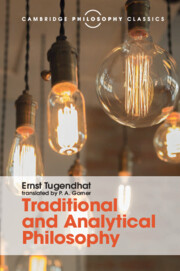Book contents
- Frontmatter
- Dedication
- Contents
- Preface
- Preface
- Translator's preface
- Part I Introduction: confrontation of analytical philosophy with traditional conceptions of philosophy
- Part II A first step: analysis of the predicative sentence
- 8 Preliminary reflections on method and preview of the course of the investigation
- 9 Husserl's theory of meaning
- 10 Collapse of the traditional theory of meaning
- 11 Predicates: the first step in the development of an analytical conception of the meaning of sentences. The dispute between nominalists and conceptualists
- 12 The basic principle of analytical philosophy. The dispute continued. Predicates and quasi-predicates
- 13 The meaning of an expression and the circumstances of its use. Dispute with a behaviouristic conception
- 14 The employment-rule of an assertoric sentence. Argument with Grice and Searle
- 15 Positive account of the employment-rule of assertoric sentences in terms of the truth-relation
- 16 Supplements
- 17 ‘And’ and ‘or’
- 18 General sentences. Resumption of the problem of predicates
- 19 The mode of employment of predicates. Transition to singular terms
- 20 What is it for a sign to stand for an object? The traditional account
- 21 The function of singular terms
- 22 Russell and Strawson
- 23 What is ‘identification’?
- 24 Specification and identification. Specification and truth
- 25 Spatio-temporal identification and the constitution of the object-relation
- 26 Supplements
- 27 Results
- 28 The next steps
- Bibliography
- Index of names
- Index of subjects
26 - Supplements
from Part II - A first step: analysis of the predicative sentence
Published online by Cambridge University Press: 05 August 2016
- Frontmatter
- Dedication
- Contents
- Preface
- Preface
- Translator's preface
- Part I Introduction: confrontation of analytical philosophy with traditional conceptions of philosophy
- Part II A first step: analysis of the predicative sentence
- 8 Preliminary reflections on method and preview of the course of the investigation
- 9 Husserl's theory of meaning
- 10 Collapse of the traditional theory of meaning
- 11 Predicates: the first step in the development of an analytical conception of the meaning of sentences. The dispute between nominalists and conceptualists
- 12 The basic principle of analytical philosophy. The dispute continued. Predicates and quasi-predicates
- 13 The meaning of an expression and the circumstances of its use. Dispute with a behaviouristic conception
- 14 The employment-rule of an assertoric sentence. Argument with Grice and Searle
- 15 Positive account of the employment-rule of assertoric sentences in terms of the truth-relation
- 16 Supplements
- 17 ‘And’ and ‘or’
- 18 General sentences. Resumption of the problem of predicates
- 19 The mode of employment of predicates. Transition to singular terms
- 20 What is it for a sign to stand for an object? The traditional account
- 21 The function of singular terms
- 22 Russell and Strawson
- 23 What is ‘identification’?
- 24 Specification and identification. Specification and truth
- 25 Spatio-temporal identification and the constitution of the object-relation
- 26 Supplements
- 27 Results
- 28 The next steps
- Bibliography
- Index of names
- Index of subjects
Summary
I would like to divide this lecture into two parts and in each part discuss one of the two questions mentioned at the end of the previous lecture.
The connection between object-relation, situation-independence and the truth-capacity of assertoric speech
The enquiry into the mode of employment of singular terms has shown that, if one disregards names, there are two ways in which singular terms can specify a perceptual object: (a) by means of an – absolute or relative – property and (b) by spatio-temporally locating the object. We were also able to show that and how the first kind of specification presupposes the second. Although I only considered the use of names in passing, in their case too it became apparent that the way in which they specify an object rests on specification by spatio-temporal localization. The analysis of the mode of employment of singular terms thus led to the conclusion that the only way to directly specify a perceptible object – and following Strawson I have called this ‘identification’ – is by specifying it by means of spatio-temporal localization.
That the fundamental singular terms are the spatio-temporally locating ones – by which we now mean not just the objectively locating ones but the whole system, presented in the last lecture, of demonstrative, deictically locating and objectively locating expressions – is a descriptive fact. It is, therefore, astonishing that hitherto it has not been clearly recognized. For the older tradition names were the fundamental singular terms – a view which could only be maintained so long as the specificatory function of singular terms had not been recognized and the mode of employment of the expressions had not been enquired about. And if recently Kripke thought he could reverse the conception, which has been characteristic of the modern tradition since Frege, of the primacy of descriptions over names, this could only achieve a semblance of plausibility because of his failure to take account of the distinction between locating and other descriptions. Strawson and those who more or less followed him have, it is true, attached great weight to locating expressions; but they have not recognized their fundamental significance, for, although they treated demonstrative singular terms as basic, they regarded them as independent in their identificatory role.
- Type
- Chapter
- Information
- Traditional and Analytical PhilosophyLectures on the Philosophy of Language, pp. 360 - 385Publisher: Cambridge University PressPrint publication year: 2016



